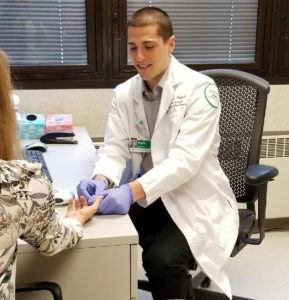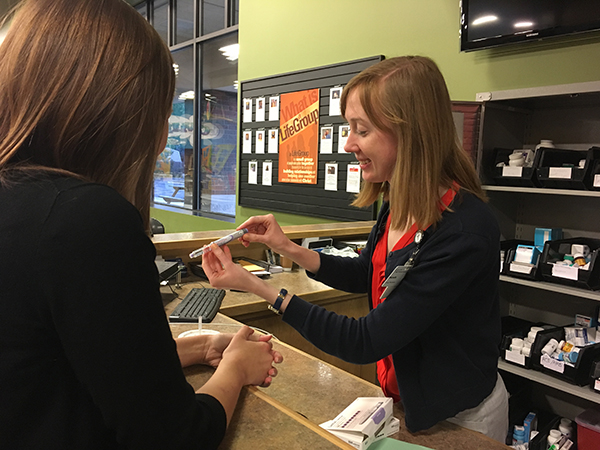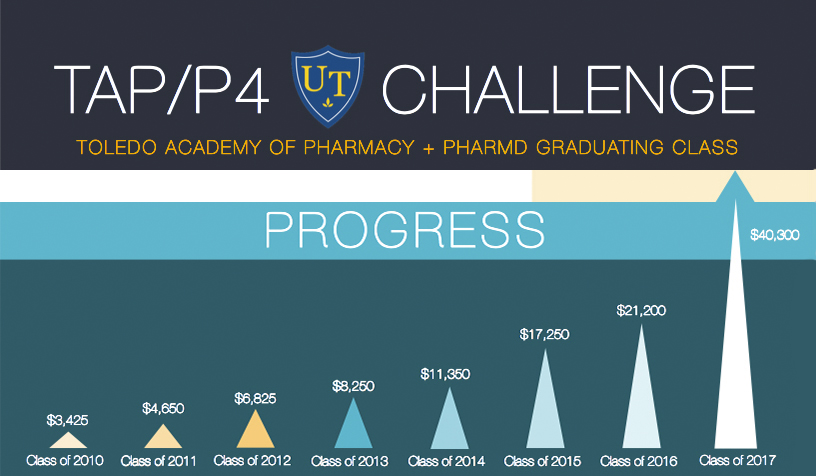Doctor of pharmacy students raise their giving through TAP/P4 Challenge

What’s the real-world value of $75? For a student in The University of Toledo College of Pharmacy and Pharmaceutical Sciences, that amount of money could help pay rent, buy groceries, pay for utilities or even go toward tuition. No matter how it’s sliced, $75 is a generous gift for a student who might be earning less than minimum wage at a side job or entering unpaid clinical rotations in the sixth year of pharmacy school.
As an early recipient of funds raised through the TAP/P4 Challenge (Toledo Academy of Pharmacy/PharmD), Angelo Iachini (Pharm, ’13 ’15) and his fellow classmates each received $75 from a young College of Pharmacy and Pharmaceutical Sciences fundraising program initiated in fall 2009. The not-for-profit Toledo Academy of Pharmacy, a professional organization for area pharmacists, supports the TAP/P4 Challenge with matching funds. What makes this philanthropic endeavor uncommon is that students have stepped up to lead the fundraising efforts. Students in every doctor of pharmacy graduating class make pledges to raise money for younger or future UT pharmacy students.
Students contribute to the monetary legacy they’re creating, and the Toledo Academy of Pharmacy matches up to $4,000. All students are encouraged to pledge $100 annually, and some students are identified to help pitch the program to their fellow classmates. “I was approached by Jeff Barton, who did a lot of fundraising for the College of Pharmacy,” says Iachini. “He helped get the scholarship program set up. I was more of a student recruiter. I went to my classmates and asked for donations to put into this scholarship fund.” Iachini also went in front of his class of about 100 pharmacy students to encourage giving.
“What is unique about this scholarship fund is that every student pharmacist gets a piece of the pie,” says Michelle Carey (Pharm ’11 ’13), who helped recruit students to pledge during the 2011-2012 academic year. “It was decided to start small with pledges of $25, $50 or $100 to test the waters, with it being a new concept,” she says. Carey says many students were willing to pledge money, even at a time when tuition was being raised, because they knew the funds would go straight to students.

Iachini would agree that students were receptive to giving. “The problem with the last year of pharmacy school is that we have to do these rotations that are unpaid, and it’s hard for people to do those and also pay for other expenses, like rent,” says Iachini. “The idea of giving students the scholarships during that last year of school, which could help offset the cost of tuition, was pretty well-received by my classmates — even though we didn’t really benefit from it that much because it was in its early stages and there wasn’t that much in the pool yet.”
“If you do a residency, you can defer your payments on the pledge,” says, Carey, who did her residency with ProMedica WW Knight Family Practice/Flower Family Practice.
The UT PharmD Program requires students to take two years of basic science and math classes. In the spring of their second year, students apply to the Pharmacy Program. Application to the program involves an interview, essay and grade evaluation. Two more years of training leads to earning a bachelor degree in pharmaceutical sciences, and after that, two more years of graduate-level training follows. Once students hit the sixth year of training, they begin doing their clinical rotations at a variety of different sites where pharmacists are employed. Rotation placements can include inpatient and outpatient care, pain clinics, cardiology, and retail pharmacies such as those at a Walgreen’s or Rite Aid.
Iachini received his $75 in 2014. “It was $75 off your overall tuition bill, but it was kind of nice to see that. For a lot of donations,” says Iachini, “you don’t see an impact. But receiving some money made it kind of nice for me to say, ‘Oh well, I pledged X amount of dollars. The pot continues to grow; the $75 might turn into $150 next year, or $300 the next.’ Other schools have started this program. The University of Michigan students were getting thousands of dollars a year, and I think the plan is to get this to that level.”
Pharmacy students in the Class of 2010 raised $3,425 once the TAP/P4 Challenge got under way. The Class of 2017 raised $40,300, and the Class of 2018 has raised $34,600. As the level of giving rises, another goal for the program is to get 100-percent participation.
Iachini pledged $500 and paid it off last year, he says. “We took pride in that we were helping future students, maybe paving the way for future students or influencing prospective students to attend UT’s Pharmacy Program,” he says.
Iachini did his residency with ProMedica after graduating in 2015. In July 2016, he started working at Toledo Hospital in the Jobst Vascular Institute Anticoagulation Service, which serves about 3,500 patients. “I get a lot of patient interaction and that was something I was looking for,” he says. He checks patients’ lab results and adjusts medications if needed. As a pharmacist in this setting, Iachini also gets to take a team approach by working with physicians, nurses and other medical personnel, such as physical therapists, to improve patient health.
Carey helps support the Toledo Academy of Pharmacy in its continuing education programming and social networking opportunities. Educational seminars provide informative sessions about important topics in medicine and new drug research and development. TAP members earn credits to maintain licensure. TAP hosts philanthropic events to raise money for the matching funds it contributes to the TAP/P4 Challenge to provide pharmacy students with financial assistance.
Carey says, as a UT alumna, she would like to continue giving to this fund. “I would donate again. It’s nice to know that 100 percent of your donation is going right back to deserving student pharmacists.”
Please contact Allie Berns at 419.530.5414 or allison.berns@utoledo.edu for more information or to make a gift. You can also make a gift online at: http://tinyurl.com/uttapp4







